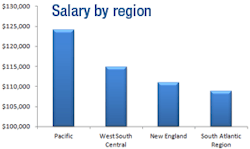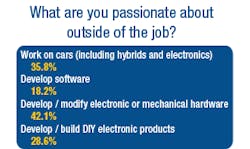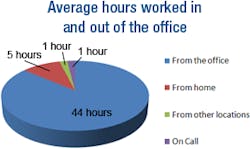This file includes a charts, graphics and data tables.
The bad news is that engineering professionals have to work harder than ever to earn those slightly higher salaries, and they are feeling more pressure than ever to keep up with rapid advances in technology.
“My biggest challenge is finding the time to devote to staying at the bleeding edge of technology,” noted one engineer. “I spend at least five hours a week of my own time at home reading, studying, and trying to learn about new technologies.”
Small Gains In Pay
Virtually all of the increases in earnings in 2012 came in base salary. On average, bonuses were flat while other sources of income (such as stock options) were lower than they were in 2011.
“New hires are paid more than when I started at a time when qualified engineers were more available. Yet there is no increase for me, with 11 years on the job,” complained one engineer. “The pay gap between experienced engineers and new hires is small and unfair. The policy here is to pay more for good candidates, rather than spending money to keep experienced engineers happy.”
- How today’s engineers stay up-to-date with technology
- Strategies engineers use to get ahead in their careers and move up the ladder
- Prospects for new grads, management hopefuls and retirees
- Regional salary and market data—where are the jobs, and how do salaries differ?
- Changing benefits and work-life balance in the engineering profession today
- Employee retention woes, and where the growing opportunities are
-
How will the potential election outcomes affect Electronic Engineers?
About the Author
Jay McSherry
Jay McSherry is president of Butterflies & Castles, Inc., a full-service marketing communications company that provides market research, strategic planning and other marketing-related services to enterprises and publishers. Before forming B&C in 1991, he'd held senior marketing management positions at some of the major B2B publishing houses, including McGraw-Hill, CMP and IDG. Jay holds a BS degree in marketing from Fordham University. He can be reached at (201) 248.5080.







